Talking to Your Houseplants Could Help Them Grow, Experts Say—Here’s the Science
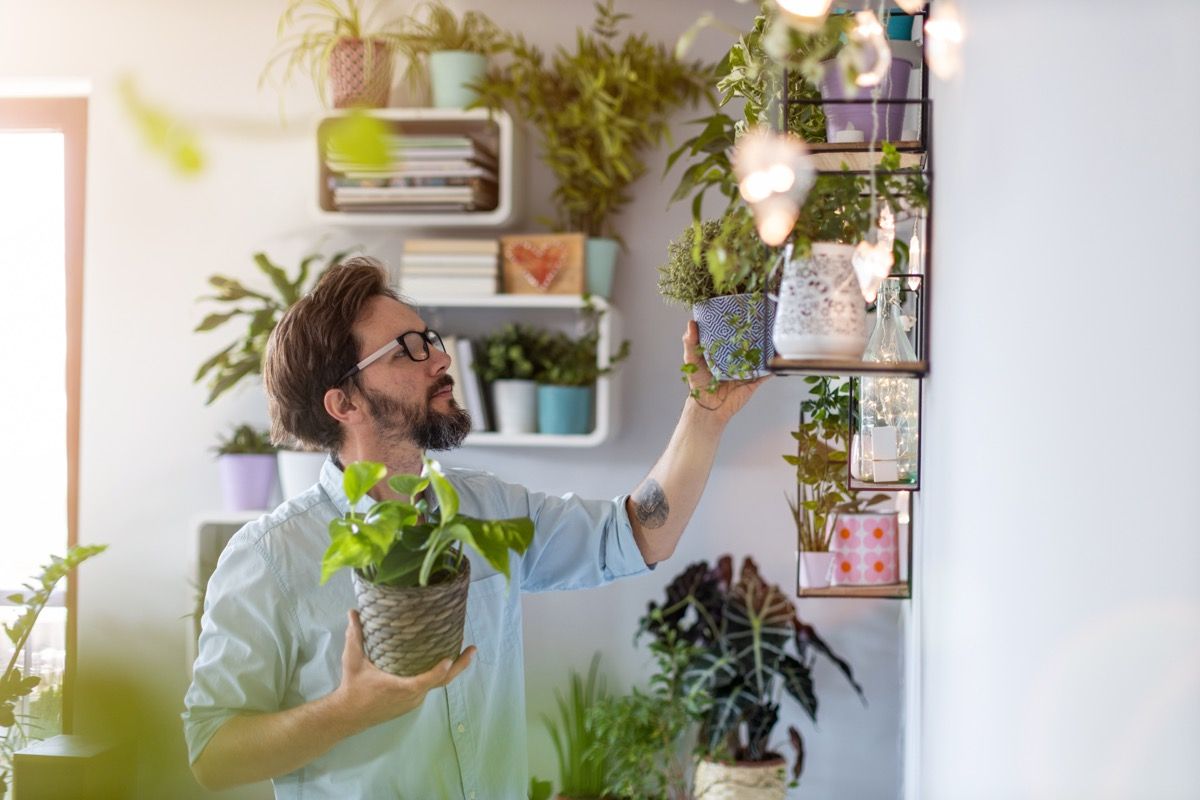
If you’re a plant parent, chances are you take this responsibility pretty seriously. You tend to your plants, make sure they have sunlight, water them, and…talk to them? If you’ve found yourself chatting with your cactus or having a heart-to-heart with your hoya plant, you’re not alone. Trees.com surveyed 1,250 plant owners, with almost half reporting that they strike up a conversation with their floral friends. Even more interesting, two-thirds of these people truly believe talking to their houseplants helps them grow.
“The idea of talking to plants may seem odd, but it’s not as far-fetched as it sounds,” Lina Cowley, gardening expert and senior editor at Trimmedroots.com, tells Best Life. “Plants are living organisms, and like any living thing, they respond to their environment.”
Several studies have been conducted to investigate the relationship between sound and plant growth, and now, our experts are weighing in on the discussion. Read on to learn the science behind plants and sound—and why you might want to chat up those in your house.
READ THIS NEXT: 5 Houseplants That Don’t Need Sunlight.
Here’s how talking to your houseplants could help them grow.
Sound certainly plays a role.
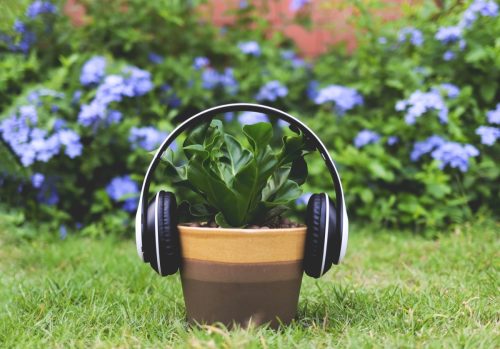
According to Jen Stark, master gardener and founder of Happy DIY Home, research suggests that sound affects plant growth, but there’s some debate as to why that is.
“Several studies have shown that talking to plants, playing music for them, or even exposing them to certain types of light can have a stimulating effect on their growth,” she explains. “One theory is that plants are sensitive to vibrations, and that talking or playing music near them can create vibrations that promote growth. Another theory is that talking to plants increases the carbon dioxide levels around them, which can encourage photosynthesis and growth.”
While some experts rebuff the carbon dioxide suggestion—arguing that you would need to be having hours of conversation each day to have a real effect—there’s a case for the vibration hypothesis. In nature, plants respond to buzzing insects and the sounds of the world around them. So, our houseplants may respond to vibrations caused by other sounds, according to Joanna Turner, of the houseplant care website Fiddle and Thorn.
There’s a lot of conversation about musical varieties.

The theory about plants and music, specifically, has been studied for some time, but results are mixed when it comes to the kind of music that’s most beneficial.
A 2003 study published in Ultrasonics found that Chinese cabbage and cucumber plants exposed to classical music and the sound of birds, insects, and water flourished, while a 2015 study published in the International Journal of Integrative Sciences, Innovation and Technology, found that music helped marigold and chickpea plants thrive, regardless of whether meditation music or light Indian music were played. In comparison, in the latter study, “non-rhythmic and unharmonious” noise had a negative effect on plant growth.
Investigators for the popular TV show Mythbusters also found that pea plants exposed to music on a loop were healthier and taller than those grown in silence. But interestingly enough, pea plants exposed to heavy metal led the pack in terms of size, surpassing those that “listened” to classical.
READ THIS NEXT: 10 Easy Hacks to Save Your Houseplants That Gardeners Swear By.
Other studies focused on the human voice.
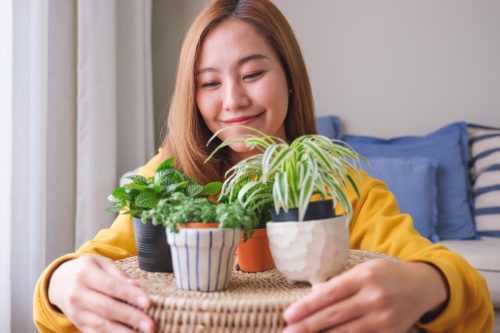
So, it appears plants like a little background noise and different kinds of tunes, but there’s limited research about how the human voice affects plant growth.
Stark pointed to a 2009 study conducted by the the U.K.’s Royal Horticulture Society, which found that tomato plants grew taller when they were talked to—especially by women. MythBusters also looked into the effects of speech in their pea plant study, concluding it’s “totally plausible” that chitchat is helpful for plant growth.
“MythBusters conducted an experiment with 60 pea plants, which showed that the plants in greenhouses with recordings of human voices showed more growth than the control group with silence,” Toby Schulz, CEO and co-founder of Lawn.com.au, says. It didn’t matter whether the words were negative or positive, either, so feel free to vent to your verbena if need be.
You might just be taking better care of a plant that you talk to.
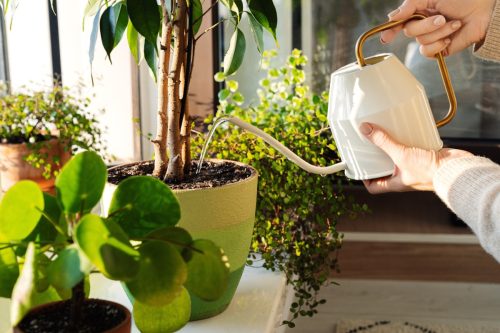
Research is inconclusive about how music and conversations affect our plants, but experts say there are other reasons you might notice your plants flourish. If you regularly give your plants the play-by-play of your day, you’re probably also ensuring that they’re well taken care of.
“There is the theoretical benefit that forging a personal connection with plants through communication leads people to take better care of their leafy friends,” Schulz says. “Since you identify with the plant, you’re more motivated to ensure it’s healthy and growing strong.”
For more home advice delivered straight to your inbox, sign up for our daily newsletter.
Talking to your plants could have even more benefits for you, as the caregiver.
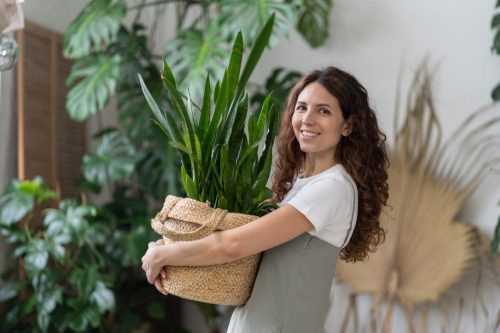
In addition to making sure your plants are thriving, chatting with your plants is also beneficial for your mental health, experts say.
“It’s worth mentioning that talking to plants does provide benefits for the person doing the talking,” Jeremy Yamaguchi, CEO of Lawn Love, tells Best Life. “Talking to plants can help to reduce stress and improve mental health by providing a sense of calm and connection with the natural world. It can also be a form of mindfulness, helping people to focus on the present moment and cultivate a sense of peace and well-being.”
And at the end of the day, there are really no cons to chatting with your plans, Stark says. “There is no harm in talking to your houseplants if it makes you feel better or if you believe it could have a positive effect on their growth,” she notes. “At the very least, it can be a relaxing and enjoyable way to connect with nature and add a little bit of green to your living space.”